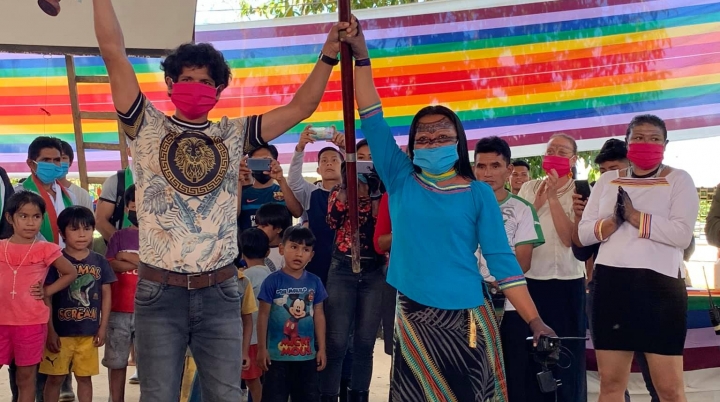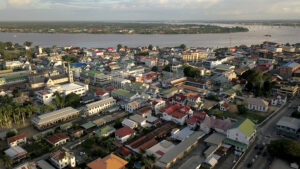
(Amazon Watch, 2.Jul.2020) — Now 8 years since the court’s decision, the community will once again demand the Ecuadorian government comply with the ruling that requires the removal of buried explosives in their territory and the guarantee of free prior and informed consultation in accordance with international and national standards.
On June 19, 2020, the Constitutional Court of Ecuador published its decision to admit a complaint filed by the Kichwa Indigenous People of Sarayaku regarding the failure to comply with a 2012 decision issued by the Inter-American Court of Human Rights. Lenin Moreno, President of the Republic, César Litardo, President of the National Assembly, Cecilia Chacón, National Secretary of Human Rights, and Dr. Iñigo Salvador Crespo, Attorney General of the State, must now answer for their non-compliance with three orders of reparation in the Sarayaku Case.
The case began in 1996 when the State of Ecuador granted a concession for oil exploration and exploitation to the Argentinian oil company CGC (Compañía General de Combustibles) in the ancestral territory of the Kichwa community of Sarayaku. After filing multiple complaints to the national authorities, the indigenous community was successful in delaying the extractive activities for several years.
However, in 2002, members of CGC forcibly entered the Sarayaku territory, guarded by both the military and private security forces. The company opened roads, used explosives, and deforested land, destroying trees and plants of sacred and cultural value to the community. Nearly 1,400 kilos of pentolite explosives were buried in their territory, putting the lives of the Sarayaku people at serious risk and threatening their access to a dignified life.
In 2012, the Inter-American Court of Human Rights ruled against Ecuador for violating the Sarayaku community’s right to physical integrity and for seriously endangering their right to life. The Court also determined the State violated the rights of the Sarayaku people to free prior and informed consultation, community ownership, and cultural identity.
Eight years later, Ecuador has yet to comply with the Inter-American Court’s ruling on three key points: (I) the removal of the explosives buried by the oil company CGC in Sarayaku territory; (II) the guarantee of free prior and informed consultation in accordance with international standards prior to any new project in Sarayaku territory; and, (III) the effective implementation of the right to free, prior and informed consultation with the participation of the communities in Ecuadorian law. Given this persistent non-compliance, Sarayaku filed suit before the Ecuadorian Constitutional Court.
The decision to admit the complaint comes at a time when Sarayaku and other indigenous peoples in the Ecuadorian Amazon are suffering from the effects of devastating floods that began in April of this year, as well as the spread of the COVID-19 among indigenous communities in the absence of assistance from the State.
Tupak Viteri, Tayak Apu (President) of Sarayaku, affirmed that despite this critical situation, they will not abandon their fight to ensure the Inter-American Court’s decision is implemented. “The State only remembers us during elections, when it wants to remove oil from our territory or when we win a trial,” he said.
The Constitutional Court should now order the regulation of prior consultation of indigenous peoples in accordance with the Constitution of Ecuador and the American Convention on Human Rights. Recently, the Ministry of Mining announced the adoption of a regulation on prior consultation on mining that again fails to meet international standards and the requirements established by the Inter-American Court.
In the coming days, under Ecuadorian law, the Court will formally notify the defendants of its decision. The State must then either comply immediately or justify its non-compliance at a hearing to be held within two days. Together with their representatives, attorney Mario Melo and the Center for Justice and International Law (CEJIL), the Sarayaku people request that the Court prioritize this trial, given they have already waited eight years for the Inter-American decision to be implemented. They also reiterate that the Ecuadorian State has an international obligation to act effectively and immediately to address the health crisis and the floods within the territory of Sarayaku, in consultation with the people, to guarantee their right to life and health.
__________

